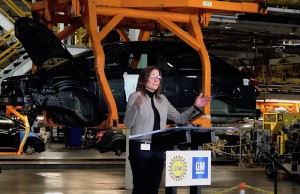
GM CEO Mary Barra says that the company’s $16-billion draw down of its credit lines is designed to bolster its cash position during the pandemic.
In a sign of the financial stress facing automakers, General Motors Co. disclosed it plans to draw $16 billion from its revolving credit lines, taking what it described as austerity measures.
GM Chairman and CEO Mary Barra described the $16-billion drawdown as a proactive measure to increase the company’s cash position and preserve financial flexibility in light of the current uncertainty in global markets due to the COVID-19 pandemic.
“We are aggressively pursuing austerity measures to preserve cash and are taking necessary steps in this changing and uncertain environment to manage our liquidity, ensure the ongoing viability of our operations and protect our customers and stakeholders,” Barra said in a statement.
(Analysts warn auto sales forecasts looking dire.)
“Over the past several years, we have made necessary, strategic decisions and structural changes that have transformed the company and strengthened the business, better positioning us for downturns,” added Barra, who sold off GM’s operations in Europe and shutdown GM’s operations in India and Australia, focusing the company’s resources on profitable enterprises.

Barra notes the extra cash from the credit lines will help GM operate its business units during the coming downturn.
“The funds will supplement the company’s strong cash position of approximately $15 billion to $16 billion expected at the end of March,” GM’s announcement noted.
GM also said it was suspending its 2020 guidance due to uncertainty around the business impact of the COVID-19 pandemic. The guidance had been optimistic about the company’s prospects this year as rolled out such as its enormously profitable heavy-duty pick-up trucks.
Several analysts are predicting substantive drops in sales, including a drop of 60% or more in April, while others have offered a range of full-year sales for 2020 to be as high as 15.3 million units and as low as 11.6 million, which was similar to the results during the Great Recession a little more than a decade ago.
(U.S. car sales verging on Great Recession-level collapse.)
In addition, GM Financial has strong liquidity and capitalization with $24 billion of liquidity at the end of 2019. The division expects to end the first quarter with similar levels of liquidity. Its liquidity level is targeted to support at least six months of cash needs, including new originations, without access to capital markets, GM’s statement noted.

Though demand is slowing, GM’s looking to ensure it can ramp back up its operations after the pandemic is over and buyers return.
“GM Financial has prepared for times like this by maintaining a strong financial position and ready access to cash. We are confident that we will be able to navigate the challenges created by this environment without capital from GM,” said Dan Berce, GM Financial president and CEO.
GM is not alone in facing stress. Moody’s downgraded Ford Motor Co. credit rating to just above investment grade. Another cut would hit Ford hard because major pension funds are required to own stock in companies that meet the investment grade threshold.
Fiat Chrysler Automobiles N.V. is facing a potentially prolonged shutdown of its Italian manufacturing base.
(Q&A: J.D. Power’s Tyson Jominy offers a look at what’s ahead.)
The Italian government this week tightened its lockdown of the country in effort to control the spread of the lethal COVID-19, which has killed thousands upended life in Italy. The government said all non-essential businesses, including industrial plants, must close until April 3, and people told to stay at home face fines of 3,000 euros. A decree issued this week gave the government the power to extend the deadline to July 31.
Meanwhile, automakers, parts suppliers and auto dealers are lobbying U.S. lawmakers on to provide “robust credit facilities” to ensure “sufficient liquidity” in the auto industry despite the coronavirus outbreak.
Trade groups representing the companies including GM, Volkswagen AG and Toyota Motor Corp , said in a letter that Congress should set up facilities “to provide loans and loan guarantees to large employers, medium-size manufacturers and small businesses.”
